Board's 'data driven' lynch mob tries to gang up on Fenger High School for 'turnaround'
Fenger Turnaround Hearing, 2/10/09
The Fenger hearing was the first “turnaround” hearing I attended, and it was interesting to see how CPS amped up the “data” portion at the beginning of the hearing.
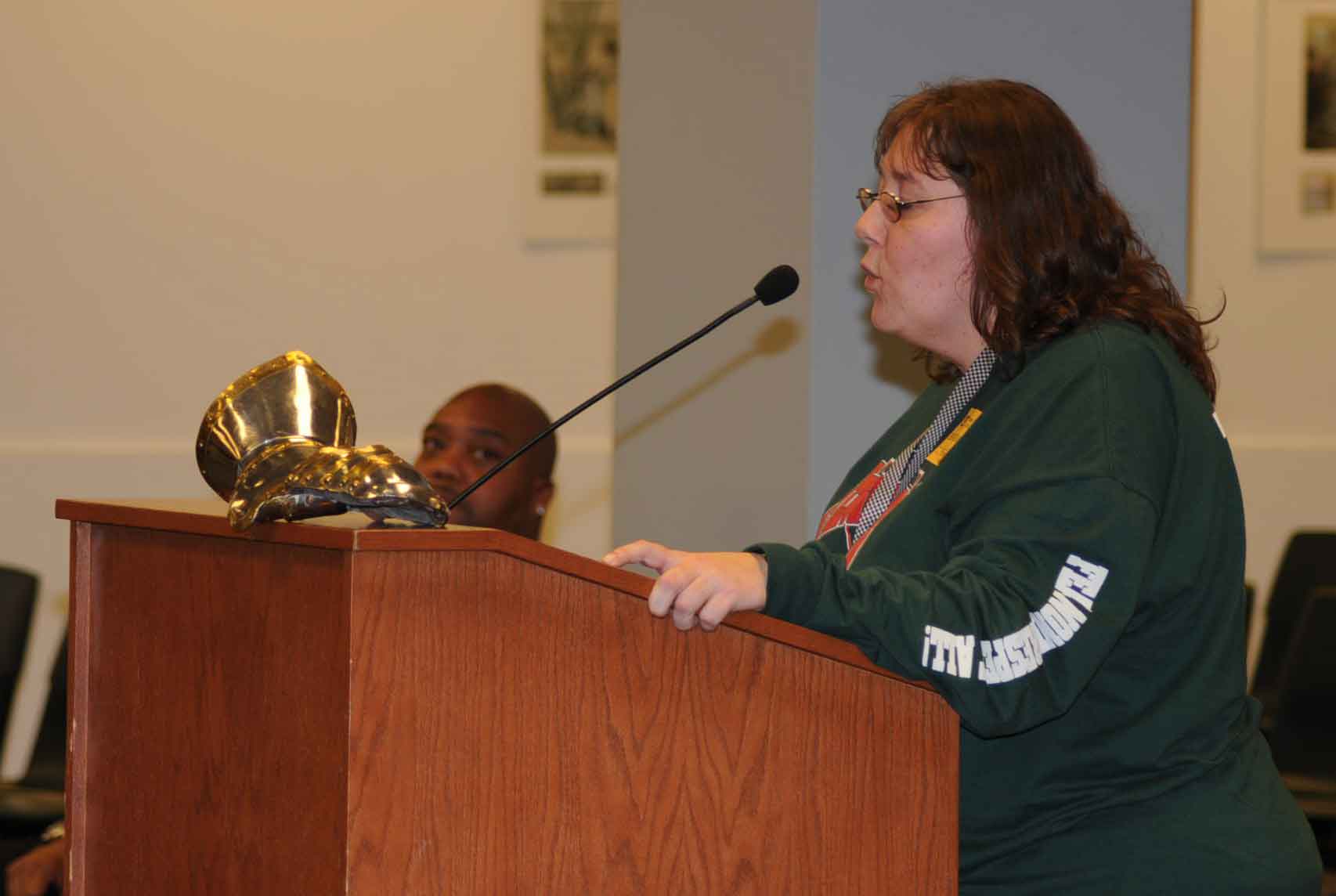 Fenger teacher Bonnie Kayser-Hicks (above) told the 'Board' she was throwing down the gantlet (on the podium) and demanding that Board members teach at Fenger for a week. Kayser-Hicks did not know that there were no members of the Chicgo Board of Education present. Earlier in the hearing, Chicago Teachers Union President Marilyn Stewart had established the fact that the people sitting behind the railing did not include any members of the Chicago Board of Education. Substance photo by George N. Schmidt. First Andrea Horton, from the Law Department, read the binder into public record and mentioned that what CPS calls “turnaround” is the same thing that under state law is called “reconstitution.” After Horton, Dr. Ginger Reynolds, who is called the Chief Officer of Research, Evaluation and Accountability, presented the data regarding Fenger, which she claimed demonstrated why Fenger was a failing school that needed to be subjected to 'turnaround' (reconstitution).
Fenger teacher Bonnie Kayser-Hicks (above) told the 'Board' she was throwing down the gantlet (on the podium) and demanding that Board members teach at Fenger for a week. Kayser-Hicks did not know that there were no members of the Chicgo Board of Education present. Earlier in the hearing, Chicago Teachers Union President Marilyn Stewart had established the fact that the people sitting behind the railing did not include any members of the Chicago Board of Education. Substance photo by George N. Schmidt. First Andrea Horton, from the Law Department, read the binder into public record and mentioned that what CPS calls “turnaround” is the same thing that under state law is called “reconstitution.” After Horton, Dr. Ginger Reynolds, who is called the Chief Officer of Research, Evaluation and Accountability, presented the data regarding Fenger, which she claimed demonstrated why Fenger was a failing school that needed to be subjected to 'turnaround' (reconstitution).
Reynolds said that Fenger had been on probation for the past 13 years. She said that because of this they had received reading coaches, math coaches and guidance in writing the school’s school improvement plan (SIPAAA). [Teachers from the school later testified repeatedly that they had never received these resources from the Board]. Reynolds said that under the reconstitution, all staff would be removed and replaced, and that “staff supports would be deployed.”
There was no mention as to what, specifically, these supports would be. Reynolds said that there were four criteria under which high schools could be chosen for turnaround:
1) the school is one of the 'lowest performing' high schools in the district
2) it has low performance, 'consistent across subjects' 3) the low performance is 'consistent over time' and
4) students are not 'catching up.'
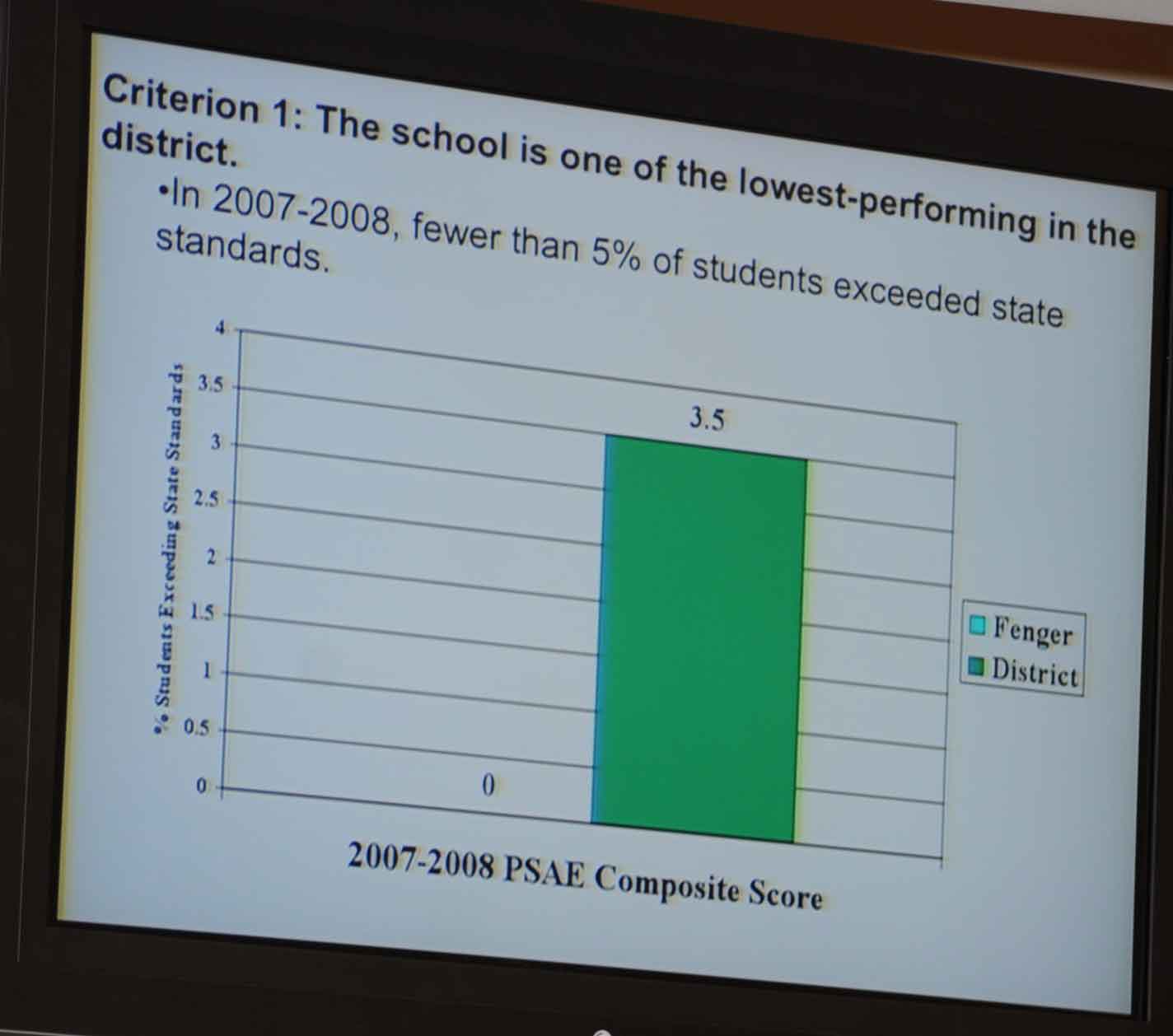 The photo above, taken from one of the video monitors in the Chicago Board of Education chambers, shows one of the many examples of what teachers are calling "Data Driven Deception" from the Fenger hearing. As teachers pointed out during the hearings and afterwards, by shorting the ascending axis (so that it only goes up to four percent, instead of to 100 percent) the chart makes it appear that the overall CPS achievement as measured by the Prairie State Achievement Exam is greater than it is and Fenger's "failure" is much more serious. Robeson High School Math Teacher Danielle Ciesiewski cited this chart as an example of falsification of data that would be exposed in math classes taught in some of Chicago's general high schools. Substance photo by George N. Schmidt.Reynolds said that overall 12 high schools met this criteria. On previous days, when describing the failure of the five elementary schools also recommended for 'turnaround', Reynolds had said that 42 elementary schools had qualified based on this year's criteria for the treatment. She did not read the names of the other schools in her prepared testimony.
The photo above, taken from one of the video monitors in the Chicago Board of Education chambers, shows one of the many examples of what teachers are calling "Data Driven Deception" from the Fenger hearing. As teachers pointed out during the hearings and afterwards, by shorting the ascending axis (so that it only goes up to four percent, instead of to 100 percent) the chart makes it appear that the overall CPS achievement as measured by the Prairie State Achievement Exam is greater than it is and Fenger's "failure" is much more serious. Robeson High School Math Teacher Danielle Ciesiewski cited this chart as an example of falsification of data that would be exposed in math classes taught in some of Chicago's general high schools. Substance photo by George N. Schmidt.Reynolds said that overall 12 high schools met this criteria. On previous days, when describing the failure of the five elementary schools also recommended for 'turnaround', Reynolds had said that 42 elementary schools had qualified based on this year's criteria for the treatment. She did not read the names of the other schools in her prepared testimony.
Reynolds then presented graphs showing how "badly” Fenger students were doing compared to the rest of the district. The majority of the graphs she showed were presented in a way to emphasize how badly Fenger was doing, and the presentation of the data was clearly skewed and framed to be alarmist and more dramatic than it really was. If one didn’t read the scaling of the graphs and only gave them a cursory viewing, it would appear that Fenger’s test scores were abysmal compared to the rest of CPS. Anyone who is on to CPS’s habit of manipulating data could easily see the flaws in the graphs.
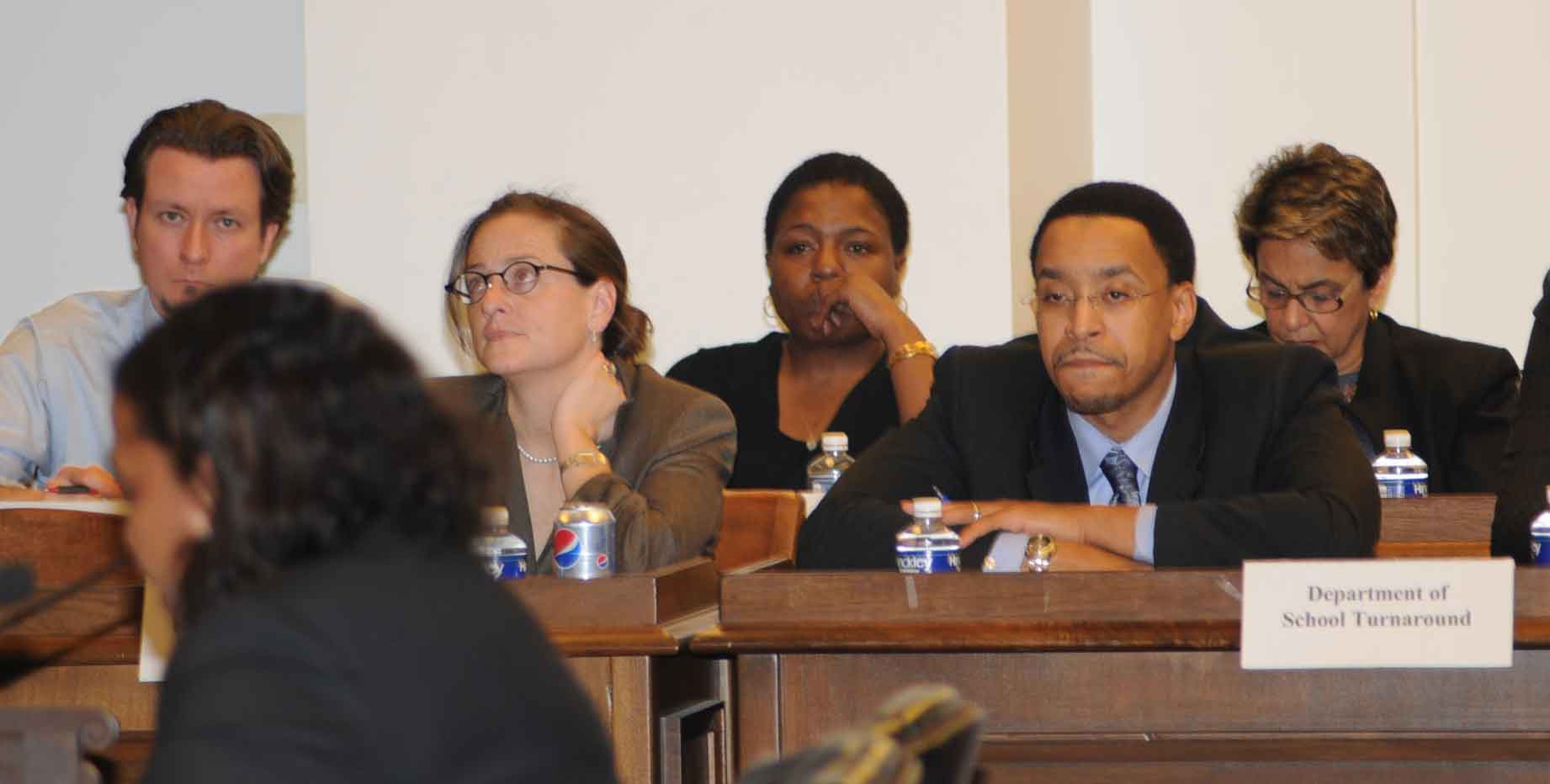 Each of the hearings on 'turnaround' over the past few years has had a ritualistic outline. First, a lawyer from the Board's Law Department reads into the record the Board's version of which laws should apply to the present situation (always ignoring federal desegregation and special education law, both of which are part of consent decrees which govern CPS). Above, Attorney Andrea Horton from the Board's Law Department (foreground, left) reads from the script. "Chief Research and Accountability Officer" Ginger Reynolds (second from left, with glasses, staring upwards) watches the recitation on the overhead monitor. "Chief Turnaround Officer" Alan Anderson (arms crossed, behind "Department of School Turnaround" sign) watches Horton. Reynolds and Anderson followed Horton in the carefully scripted session, each presenting both the legal framework and the carefully edited data without reference to the context faced by the students, teachers, and families of Fenger High School. Substance photo by George N. Schmidt.For example, Reynolds showed a graph that displayed the percentage of students exceeding standards. Fenger had 0% of their students exceeding, but the district itself only had 3.5% exceeding. Is 3.5% that big of a difference? No to most people, but the graph presented by Reynolds was scaled so that 4% was the high range of data -- instead of the real top, which would have been at 100 percent. So looking at the graph, Fenger had no bar, but CPS as a whole had a bar reaching nearly the top of the graph.
Each of the hearings on 'turnaround' over the past few years has had a ritualistic outline. First, a lawyer from the Board's Law Department reads into the record the Board's version of which laws should apply to the present situation (always ignoring federal desegregation and special education law, both of which are part of consent decrees which govern CPS). Above, Attorney Andrea Horton from the Board's Law Department (foreground, left) reads from the script. "Chief Research and Accountability Officer" Ginger Reynolds (second from left, with glasses, staring upwards) watches the recitation on the overhead monitor. "Chief Turnaround Officer" Alan Anderson (arms crossed, behind "Department of School Turnaround" sign) watches Horton. Reynolds and Anderson followed Horton in the carefully scripted session, each presenting both the legal framework and the carefully edited data without reference to the context faced by the students, teachers, and families of Fenger High School. Substance photo by George N. Schmidt.For example, Reynolds showed a graph that displayed the percentage of students exceeding standards. Fenger had 0% of their students exceeding, but the district itself only had 3.5% exceeding. Is 3.5% that big of a difference? No to most people, but the graph presented by Reynolds was scaled so that 4% was the high range of data -- instead of the real top, which would have been at 100 percent. So looking at the graph, Fenger had no bar, but CPS as a whole had a bar reaching nearly the top of the graph. 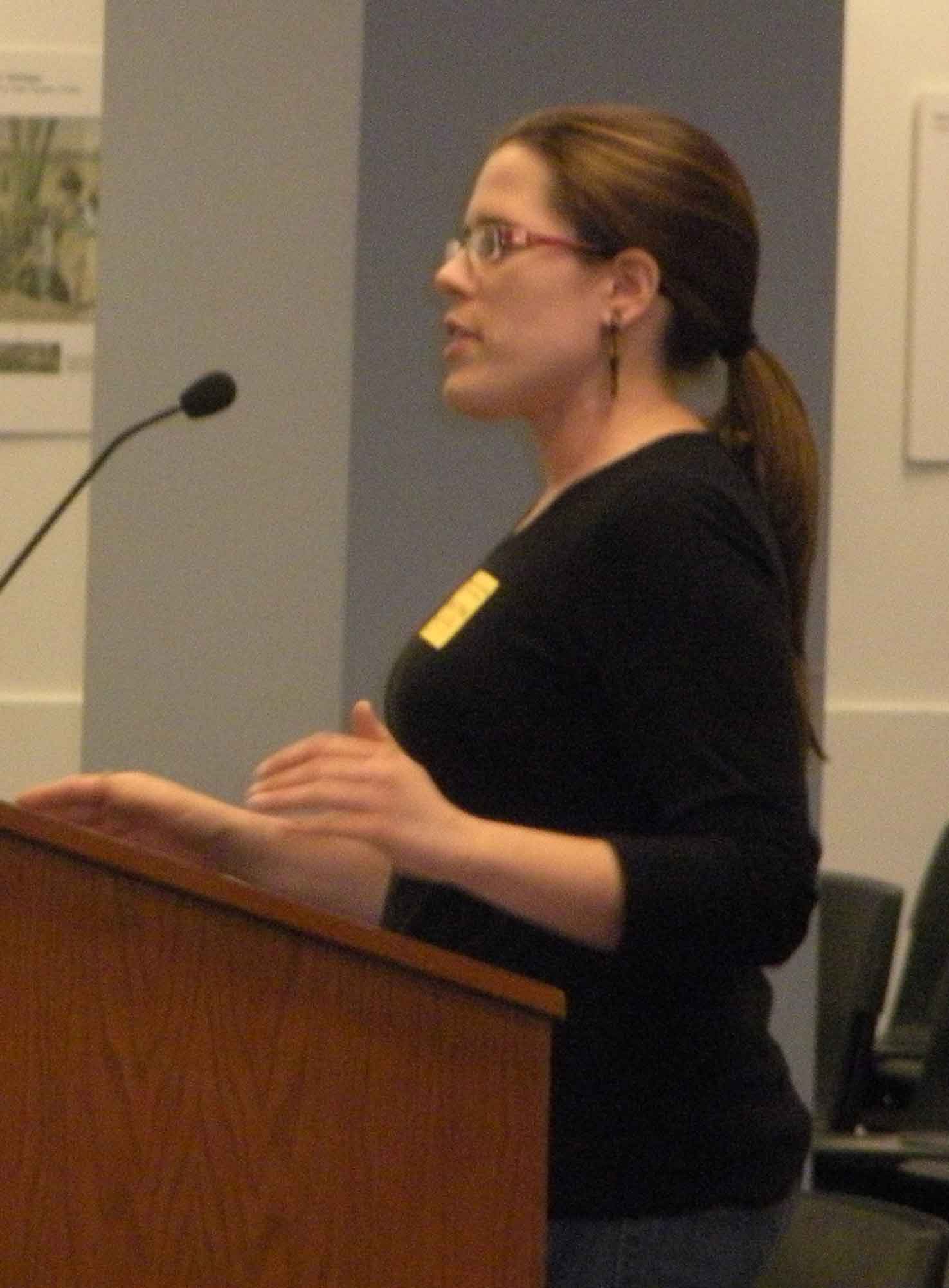 In addition to bringing a message of support to the Fenger teachers from CORE, Robeson High School math teacher Danielle Cieszewski (above) noted that the way in which the data were presented by CPS officials was deceptive and would have been recognized as such by her math students, who are taught to recognize such deceptions. Substance photo by George N. Schmidt.Danielle Ciesiewski from CORE (a math teacher from Robeson High School) made sure to point this out to Reynolds and the audience during the testimony, but more on that later.
In addition to bringing a message of support to the Fenger teachers from CORE, Robeson High School math teacher Danielle Cieszewski (above) noted that the way in which the data were presented by CPS officials was deceptive and would have been recognized as such by her math students, who are taught to recognize such deceptions. Substance photo by George N. Schmidt.Danielle Ciesiewski from CORE (a math teacher from Robeson High School) made sure to point this out to Reynolds and the audience during the testimony, but more on that later.
CPS has a 'Department of School Turnaround' with a 'Director of School Turnaround'
Anyone who expected CPS to bring in the Academy for Urban School Leadership (AUSL) for another crack at turning around a school was surprised to learn that AUSL isn't the only place at CPS where 'turnaround' is being practiced. Following Reynolds, Alan Anderson, the 'Director of School Turnaround' testified to the effectiveness of turnarounds in CPS. He gave very little actual data and his testimony was filled with vague phrases such as “strong-evidence based strategies” and “marked improvement.” He claimed that Dodge’s [elementary school's] ISAT scores have gone up 39 points since its so-called 'turnaround,' but did not specify which grade levels or subjects they saw this increase in.
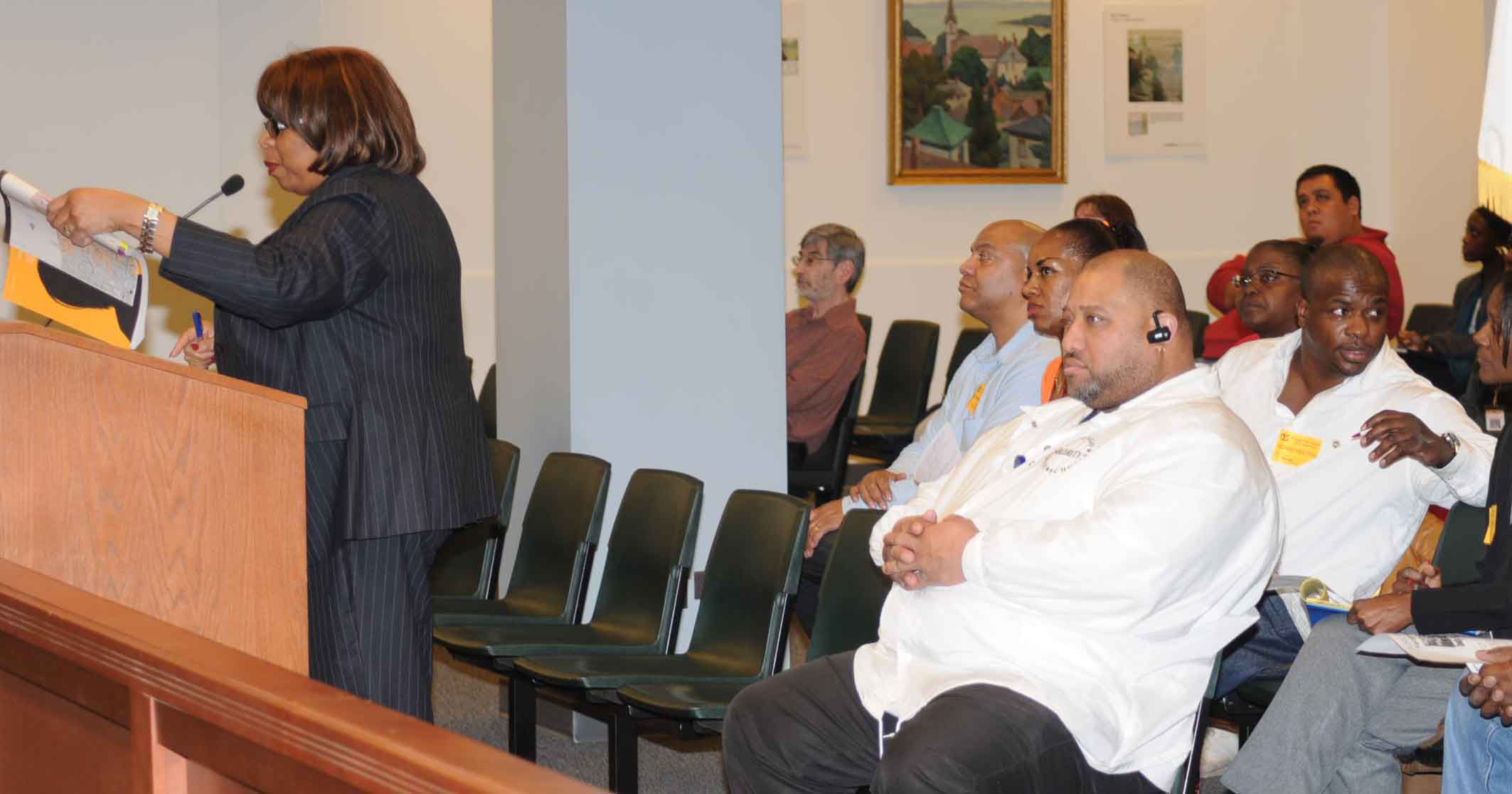 Chicago Teachers Union President Marilyn Stewart (above, left) returned to the hearings after a puzzling absence of one week. Stewart cited the Board of Education's own "High Schools Handbook and Directory" to question how the Board could attack Fenger when Fenger has an enormous special education population, many of whom were not receiving services. Substance photo by George N. Schmidt.Anderson neglected to mention the stagnant test scores at the other turnaround schools.
Chicago Teachers Union President Marilyn Stewart (above, left) returned to the hearings after a puzzling absence of one week. Stewart cited the Board of Education's own "High Schools Handbook and Directory" to question how the Board could attack Fenger when Fenger has an enormous special education population, many of whom were not receiving services. Substance photo by George N. Schmidt.Anderson neglected to mention the stagnant test scores at the other turnaround schools.
Anderson testified that the new staff at Fenger would be made up of “highly qualified, experienced teachers” that would receive “district supported professional development,” would learn “instructional strategies” and would partner with CPS so that “administration, teachers, and staff could compare strategies.” None of these so-called innovations sound very innovative to me. Anderson also noted that some group from the University of Virginia that was supposedly expert in 'turnaround' would also be involved. No plans were distributed to the audience, which consisted mostly of teachers from Fenger.
CTU President disagrees with 'turnaround'
Marilyn Stewart, President of the Chicago Teachers Union (CTU) was the first to testify on behalf of Fenger. She opened by saying that she had been there “night after night” hearing testimonies of schools. She said that Fenger already has a highly qualified and professional staff. She pointed out that during the Board’s justification of turning around Fenger, there was no mention of how 25 percent of the Fenger students are already in special education programs -- and how as many as 35 percent of the rest of the students have "unidentified special education needs." Stewart said that many Fenger students are reading at the '2nd and 3rd grade level' despite CPS claims that nobody gets out of elementary schools without being able to read. She mentioned that there are 111 homeless students attending Fenger. Stewart also pointed out that Fenger used to be a top school in the area until the neighboring high schools (Brooks, Morgan Park, and Carver) became selective enrollment schools and Fenger’s boundaries were changed. Basically, Fenger became the 'dumping ground' for the students nobody else cared about. Stewart said that this upset the balance of students at Fenger. She equated these changes as creating a special education school out of Fenger. She didn't mention that during the past four years, CPS has also expanded charter high schools in that part of the South Side, leaving fewer options outside Fenger for students nobody else wants. (Charter high schools require pre-screening of their students and have numerous ways of 'counseling out' discipline problems and students who might create low test scores.
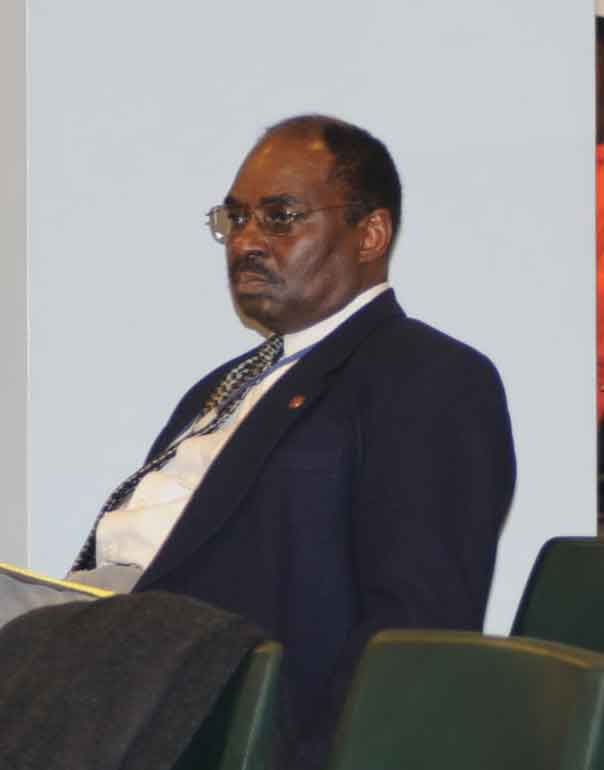 Chicago Teachers Union 'field rep' Nate Dickson (above) attended the Fenger hearing but did not speak. One of the puzzling things about the 2009 hearings was that while the President of the Chicago Teachers Union was declaring that the changes should be postponed, union staff were going around to the schools telling teachers and other union members that the 22 schools were facing a "done deal." The gap between the union's remaining officers (by the time of the 2009 hearings, Stewart had purged her Vice President, Ted Dallas, and ordered the union's Treasurer, Linda Porter, to remain at the union offices without duties) and the needs of the union's members was noted at meetings across the city. Substance photo by George N. Schmidt.Testimony on these methods had been given a month before the Fenger hearing at the CORE forum at Malcolm X College on January 10.) Stewart received applause from the audience when she asked how the Board could have let Fenger remain on probation for 13 years without giving them additional resources and creating what amounted to a “dumping ground” out of the school.
Chicago Teachers Union 'field rep' Nate Dickson (above) attended the Fenger hearing but did not speak. One of the puzzling things about the 2009 hearings was that while the President of the Chicago Teachers Union was declaring that the changes should be postponed, union staff were going around to the schools telling teachers and other union members that the 22 schools were facing a "done deal." The gap between the union's remaining officers (by the time of the 2009 hearings, Stewart had purged her Vice President, Ted Dallas, and ordered the union's Treasurer, Linda Porter, to remain at the union offices without duties) and the needs of the union's members was noted at meetings across the city. Substance photo by George N. Schmidt.Testimony on these methods had been given a month before the Fenger hearing at the CORE forum at Malcolm X College on January 10.) Stewart received applause from the audience when she asked how the Board could have let Fenger remain on probation for 13 years without giving them additional resources and creating what amounted to a “dumping ground” out of the school.
Stewart continued by asking how many Board members were present (there weren’t any) and how many had been there for the other hearings. Stewart pointed out that there are teachers at Fenger who hold doctorate degrees and multiple masters degrees.
She also pointed out that the numbers Anderson cited claiming the success of 'turnaround' for Dodge Elementary School (on the West Side) did not prove the effectiveness of turnarounds because the neighborhood had become gentrified. Dodge was one of the first schools closed under the early 'renaissance.' In June 2002, CPS ordered Dodge closed for one year. In September 2003, Dodge was reopened, but with a different student population. Since then, AUSL has claimed that Dodge was proof that its 'turnaround' methods work. She said, “you change the population, you change the scores.”
Stewart said the experienced teachers at Fenger need intensive support rather than being replaced, and equated replacing veteran teachers with new graduates to replacing all veteran police officers with rookies and expecting crime to go down in the city. Stewart ended her testimony by saying that the parents of Fenger students should sue CPS if they are “not magically meeting standards” next year after the turnaround.
Fenger 'Family' supports school's teachers, opposes 'turnaround'
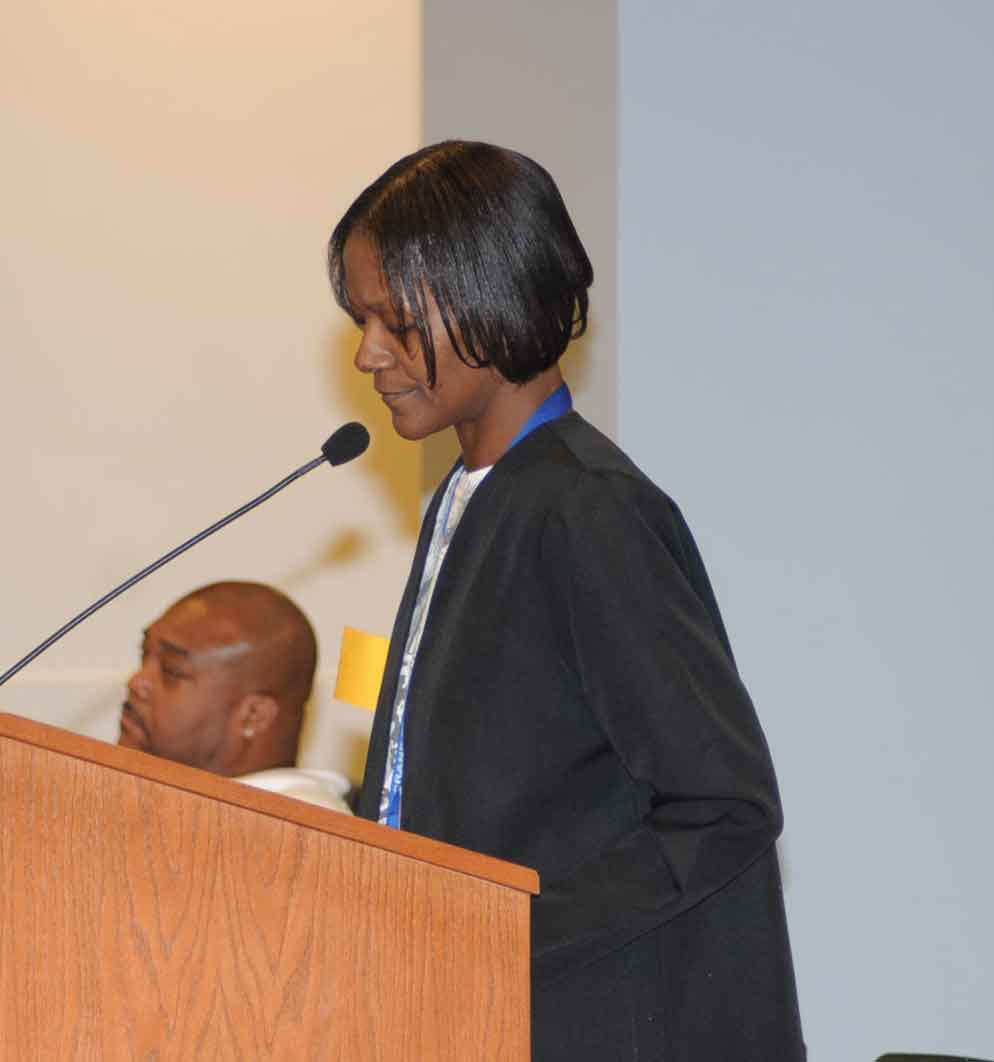 Fenger Local School Council member Alice Hill was one of many who asked why Fenger was not being recognized for the fact that it took in the children that everybody else rejected and tried to work with them. Subsance photo by George N. Schmidt.Alice Hill, an LSC member began her testimony saying that she was very disturbed by the turnaround proposal and asked what CPS had done to support Fenger over the past 13 years of being on probation. She asked what plan they had created to help. Hill pointed out that Fenger was only in its 4th year of probation under No Child Left Behind (NCLB) and that staff is not supposed to be replaced until the 6th year of NCLB probation.
Fenger Local School Council member Alice Hill was one of many who asked why Fenger was not being recognized for the fact that it took in the children that everybody else rejected and tried to work with them. Subsance photo by George N. Schmidt.Alice Hill, an LSC member began her testimony saying that she was very disturbed by the turnaround proposal and asked what CPS had done to support Fenger over the past 13 years of being on probation. She asked what plan they had created to help. Hill pointed out that Fenger was only in its 4th year of probation under No Child Left Behind (NCLB) and that staff is not supposed to be replaced until the 6th year of NCLB probation.
I spoke next and focused on the argument that the teachers and staff at Fenger were not the problem, but the issues in the community as well as a lack of support for the staff were the real problem. I asked why the resources that will be given to new teachers next year were not given to the existing faculty of Fenger. I pointed out that the “miracle” turnaround school Sherman [Elementary School] had lower test scores than neighboring Holmes -- but that Holmes was also due to be turned around. I asked if the Board was planning to start turning around the turnarounds due to their own lack of performance. I concluded by demanding a moratorium on closings, turnarounds, phase outs and consolidations and by asking where the Board members were.
Bonnie Kayser-Hicks, a math teacher from Fenger spoke next. She began by saying she was there to put forth a challenge to the Board. She said that since she was being blamed for her students not achieving, she was going to “lay out the gauntlet.” She took out a prop gauntlet and laid it on the podium. She said she would like members of the Board to come out to teach at Fenger for a week and get to know the students there.
She said that turning around the school would be dehumanizing to the students who are already suffering. She pointed out that Fenger lost a student to violence just before winter break and that students have difficulty concentrating on and caring about school when they are busy asking themselves if they “will live to see the next day.” She said that despite the state of the community, she was working with her students to make positive changes such as a community garden. She ended by saying “let’s do something positive in the community not by turning around the staff.”
Teresa Moore, a parent, said that she came to the hearing because she was trying to understand what “turnaround” would mean for Fenger. She asked if there would be an elected LSC and if parents would still have their rights to one. She asked if new police officers would be appointed to the school or will the same ones stay on. She said that discipline had not been rectified at the school because “the same old people” were “doing the same old thing” in regard to student safety. Moore said that she wanted a voice for parents. She pointed out that many teachers were at school from 6 am to 9 pm and asked the hearing officer to acknowledge the tenured and seniority teachers when they turn the school around.
Sharon Baker, an LSC member since 1989 said that the hearing was making her sick and asked that someone visit Fenger before a decision was made. She pleaded for the Board to “come see what we need” and pointed out that there were good teachers at Fenger. She asked where the Board had been for the past 13 years and said that “you can’t blame teachers” because they had “asked for books but didn’t get them.”
Teachers stand up for their professionalism, dignity
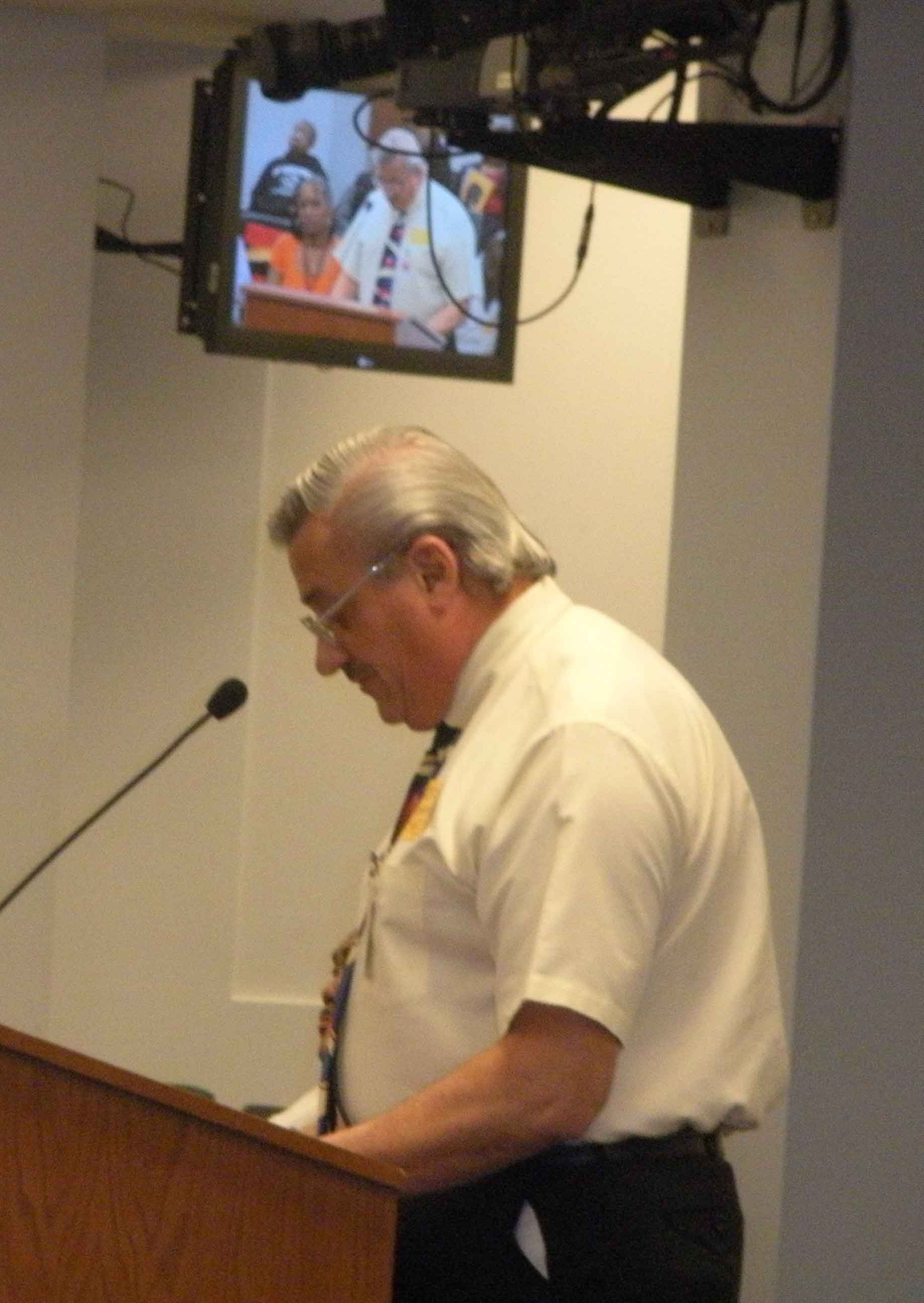 Fenger guidance counselor Gerald Arena (above) challenged the "data" being used to condemn Fenger and its staff. He noted that last year Fenger graduated 161 students, the greatest number in five years, and that the increase was the result of the hard work of the Fenger staff in the face of the realities of the lives of Fenger's students. Arena talked, as he put it, "from the trenches" and demanded that 'The Board" (none of whose members were present) spend time at Fenger and feel the challenges Fenger students, families and staff face every day. These include the fact that Fenger is currently serving a higher percentage of students with special needs of any general high school on the South Side; that Fenger regularly receives students who are fresh out of jail (and not accepted at any other high school in the area); and that Fenger's students and families regularly have to deal with a level of gang violence -- including murder -- that most people in the USA only learn about through media or HBO fictionalizations like "The Wire". Substance photo by George N. Schmidt.Gerald Arina, a counselor from Fenger was an especially spirited speaker. He said that while the decisions were made from executive offices, that the people at Fenger were “in the trenches, doing the best with what we have.” He pointed out that in 2008 Fenger graduated 161 students, the highest number in five years. Arina said that Fenger has a high percentage of students with criminal records and gang affiliation forced upon them, that one-third of the students were are in special education, while another third were unidentified, but needed special education services. He pointed out that the majority of the students come into Fenger unable to ever read “Dick and Jane and Spot” books.
Fenger guidance counselor Gerald Arena (above) challenged the "data" being used to condemn Fenger and its staff. He noted that last year Fenger graduated 161 students, the greatest number in five years, and that the increase was the result of the hard work of the Fenger staff in the face of the realities of the lives of Fenger's students. Arena talked, as he put it, "from the trenches" and demanded that 'The Board" (none of whose members were present) spend time at Fenger and feel the challenges Fenger students, families and staff face every day. These include the fact that Fenger is currently serving a higher percentage of students with special needs of any general high school on the South Side; that Fenger regularly receives students who are fresh out of jail (and not accepted at any other high school in the area); and that Fenger's students and families regularly have to deal with a level of gang violence -- including murder -- that most people in the USA only learn about through media or HBO fictionalizations like "The Wire". Substance photo by George N. Schmidt.Gerald Arina, a counselor from Fenger was an especially spirited speaker. He said that while the decisions were made from executive offices, that the people at Fenger were “in the trenches, doing the best with what we have.” He pointed out that in 2008 Fenger graduated 161 students, the highest number in five years. Arina said that Fenger has a high percentage of students with criminal records and gang affiliation forced upon them, that one-third of the students were are in special education, while another third were unidentified, but needed special education services. He pointed out that the majority of the students come into Fenger unable to ever read “Dick and Jane and Spot” books.
Arina questioned Reynolds’s claim that assistance had been sent to Fenger, saying “no one came out, we do the best we can.” Arina said that Fenger receives a high percentage of students that have been “dropped from other places” and that a high percentage of students come to them from out of state with “no grades or low grades.” He testified that he receives phone calls from Clark Street telling him “you gotta take this kid,” meaning students that wouldn’t be accepted at other high schools. Arina pointed out that 90% of Fenger’s students receive reduced lunch. He said that their attendance was currently at 90% and rising. In recent years he has noticed fewer fire alarms being pulled and that behavior was improving in the school. Arina said that he works hard and is proud to be a member of Fenger.
A woman whose name I didn’t hear spoke next. She is a vice-chair of the NCLB Council. She acknowledged that Fenger needed a change and asked that they “stop making Fenger a dumping ground.”
'Major improvements' taking place at the school
George Huff Jr., a post-secondary education coach from Fenger spoke next, saying that this is his fourth year at Fenger and that he has noticed a major improvement in the school. He said that the number of fire alarms pulled and fights were down in the school. He highlighted Fenger’s achievement of winning first place in a mock-trial competition and said that their ROTC program was respected. He said staff was changing the atmosphere at the school “through care and honor of profession.”
Huff said that since the income and achievement levels of Fenger students were so low that they have to do “double the work just to stay behind.” He asked the Board to take into account where the students started when they entered Fenger, and to judge the growth they have made based on this, rather than comparing them to other students. He said that the Board has created the problems by “pointing a finger from downtown.” Huff asked who was going to take the blame next year when they do not see a change in Fenger after the turnaround. Huff stated that he came from a background in the military and business worlds and said that in those settings, people in charge do not make decisions without first surveying the situations they are dealing with.
Huff told then told a story about a trip to Springfield with students where they were accompanied by a woman from one of CPS’s downtown departments. Huff said on the way home from Springfield, the woman was crying on the bus. When he asked her why she was crying, she said that she was embarrassed because she had listened to what everyone had said about the students from Fenger and that what they had said was wrong.
A technology teacher from Fenger, Dr. Merriam Warren, spoke next and pointed out that there is a high rate of absences at Fenger. She said that people needed to look at why the students were absent so often. She said that many students at Fenger are absent because they are working and trying to support their families. She said they needed resources such as work programs to help them. Warren said that teachers cannot be blamed for students not achieving when they do not attend class. She asked that the Board look at possible interventions instead of turnaround such as smaller class sizes, changing expectations to meet the learning styles of the community. She stated that the problems at Fenger are “yours at CPS, not just ours at Fenger.”
Dr. Lucille Durham, a teacher at Fenger said that she was a department chair at the school and a coordinator for small learning communities. She said that she herself lives in the community and that many parents have told her that they send their children to Fenger because they know Durham and what she represents. Durham said she tutors students free of charge because she knows there is a need for it. She said that if you love the job, you go beyond by sacrificing your own time and that you feel rewarded when the students come in to receive the extra help.
She said that many students cannot reach the material because they come in performing so far below grade level.
Warren said she had personally reached out to Christian Fenger’s great-great granddaughter to supply resources for the school. Warren stated “I’m a teacher without any resources.” She said she wanted books for her students so that they could take them home and she wouldn’t need to make copies of the books at home with her own ink anymore. She said that she would like to see Fenger’s students “stand shoulder to shoulder with Payton students, but I know what we’re working with.”
Mr. Johnson (who did not give his first name), a French teacher, described the personal difficulties students at Fenger face through a series of stories from his classroom. He said that he once asked a student in conversation what they wanted as an exercise in speaking French. The student replied that he wanted to have a meal. Johnson said that many of his students come to school hungry and that it is hard to learn when you do not have enough to eat. He said many of his students work at night to support their families and are often too tired to learn. He said in conversations in class many students had told him that they had had guns pointed at them and some had even been shot. Johnson asked where the resources were for the people at Fenger. He said they needed small class sizes, an extended day, teacher mentorship programs, and a small learning community.
Darryl Gibson, and William “Dock” Walls spoke next and approached the podium together. Gibson spoke first, saying that he lived in the community and had worked with numerous organizations including the Departments of Education and Justice “trying to blow the whistle” on financial mismanagement at Fenger. He said that the problems at Fenger were “not just a matter of resources” and stated that there was “corruption” and that the “business model” was failing. He said that the current principal at Fenger had come from another school (Carver) that had been on probation for 10 years under his leadership and asked how the Board could allow this. He said that Fenger needed a turnaround. Gibson said that gentrification had caused the boundaries of Fenger to change and that Arne Duncan’s leadership had been a detriment to the neighborhood. The hearing officer then asked Gibson if he was a parent of a Fenger student, to which he replied “I would not allow my kids to go to Fenger.” Gibson said that he was happy for Fenger to be a turnaround and acknowledged that there are “some good people at Fenger.” He concluded by suggesting that the Board “turn it into a trade school.”
Walls spoke next and said that “the Board of Education has failed children, parents, and teachers” because they are not getting resources.. He said that a superior public education transcends a building. He said that the Board’s job is to provide resources to form a partnership with students and said that “this Board of Education has not done this.” Walls said he opposed the turnaround of Fenger. He said that the teachers give unselfishly of themselves and they aren’t given the support they need. He said it was unfair to tell them that there are “others waiting in the wings” for their jobs when they have been doing something with nothing for so long. He concluded by asking how the Board can sleep soundly “knowing you haven’t kept your commitment to our communities.”
Victor Granberry, an LSC member for 8 years, discussed the issues of the community and how they affect the students of Fenger. He said there is a “state of emergency” due to joblessness and homelessness in the community and that despite turnaround, there will be “continued chaos.” Granberry stated that “this fight is going to go off” implying that the community was no longer going to sit back while others made decisions regarding their neighborhood. He concluded by saying “a fight is getting ready to happen.”
George Schmidt, editor of Substance, spoke next and said that the Board of Education was composed of “tyrants sabotaging education.” He called CPS and the city of Chicago “the shame of the United States” due to their history of racial segregation. Schmidt presented the hearing officer with a spreadsheet of data about the six schools turned around since 2004 and pointed out that each one was comprised of 100% African American students. He stated that the schools were “failing due to school board sabotage” and said that as a result of spending 50 years under the control of two Daleys, Chicago is the “most segregated city in the country.” Schmidt said that the citizens of Chicago are “victims of insidious systems of misinformation.” Schmidt asked how people from Virginia could be qualified to turn around schools in Chicago. He suggested that people from Mississippi be contracted instead because they had a better understanding of “economic racial segregation.” Schmidt concluded that turnarounds are a “hypocritical attempt to blame the victims” and said that it “won’t go unavenged [sic].”
Matthew Johnson, who works at the Cook County Detention Center spoke next. He said that a lot of people “say we’re for the kids” but really aren’t. He said that Fenger needs accountability and that disciplinary action was needed for those that are not doing their jobs. Johnson asked what would the new teachers next year do in the face of violence in the school and community. He said that the turnaround movement was politics and nothing more. Johnson said that he himself had been a “student at a dumping ground” and that his school had had quality teachers. He stated that the so-called experts making decisions haven’t been to the school and asked that these people ask themselves if “you are truly doing this for the kids” and suggested that they all “look yourself in the mirror.”
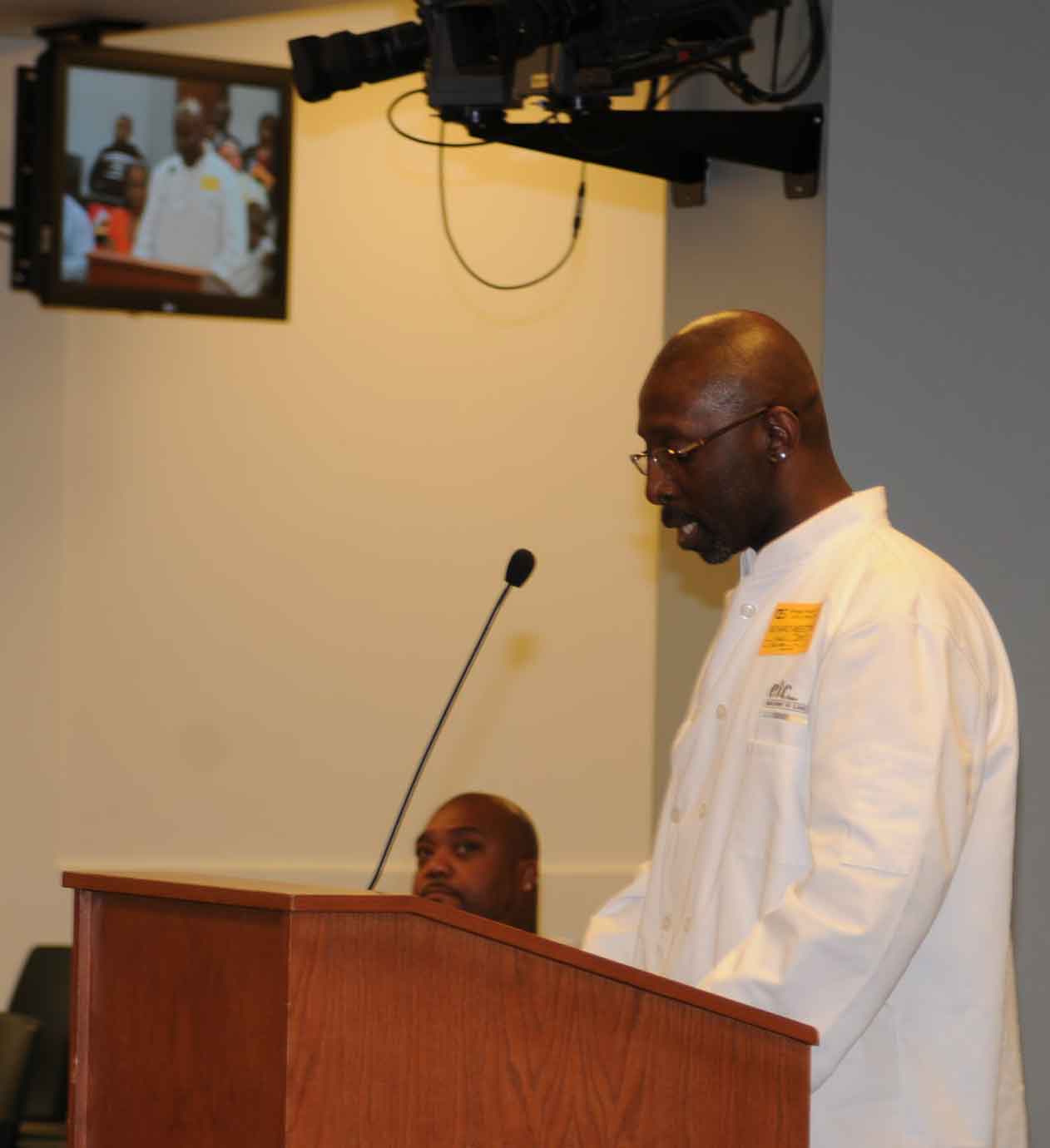 Culinary Arts teacher David Little (above) spoke about the heart breaking difficulties facing Fenger's students, but there were no members of the Chicago Board of Education there to hear his words. Substance photo by George N. Schmidt. David Little, a culinary arts teacher said that the Board had stated they would bring in qualified teachers, but that Fenger already had qualified teachers. He said that many teachers currently working at Fenger have two masters degrees in education. He said that the blame was being placed on them, while the student population wasn’t being taken into account. Little said that many students were misdiagnosed as having learning disabilities and that many had mental disorders and were being set up to fail. Little asked that Fenger be restructured rather than turned around since they cannot select their students and have limited resources. He asked that Fenger be given more materials.
Culinary Arts teacher David Little (above) spoke about the heart breaking difficulties facing Fenger's students, but there were no members of the Chicago Board of Education there to hear his words. Substance photo by George N. Schmidt. David Little, a culinary arts teacher said that the Board had stated they would bring in qualified teachers, but that Fenger already had qualified teachers. He said that many teachers currently working at Fenger have two masters degrees in education. He said that the blame was being placed on them, while the student population wasn’t being taken into account. Little said that many students were misdiagnosed as having learning disabilities and that many had mental disorders and were being set up to fail. Little asked that Fenger be restructured rather than turned around since they cannot select their students and have limited resources. He asked that Fenger be given more materials.
Xian Barrett of CORE spoke next and said that he “fervently opposed the turnaround.” He said that the turnaround criteria are “a sham.” He stated that the standards were set up as “a net to catch all neighborhood schools.” Barrett said that he had recently heard new Board CEO Ron Huberman say that “anyone caught lying with data should be shown the door.” He suggested that Dr. Reynolds be shown the door. Barrett said that the district has resources and that they should be given to neighborhood schools. He suggested that the new “experts” being brought in should have to apply for the jobs like the teachers with doctorate degrees in the audience will have to.
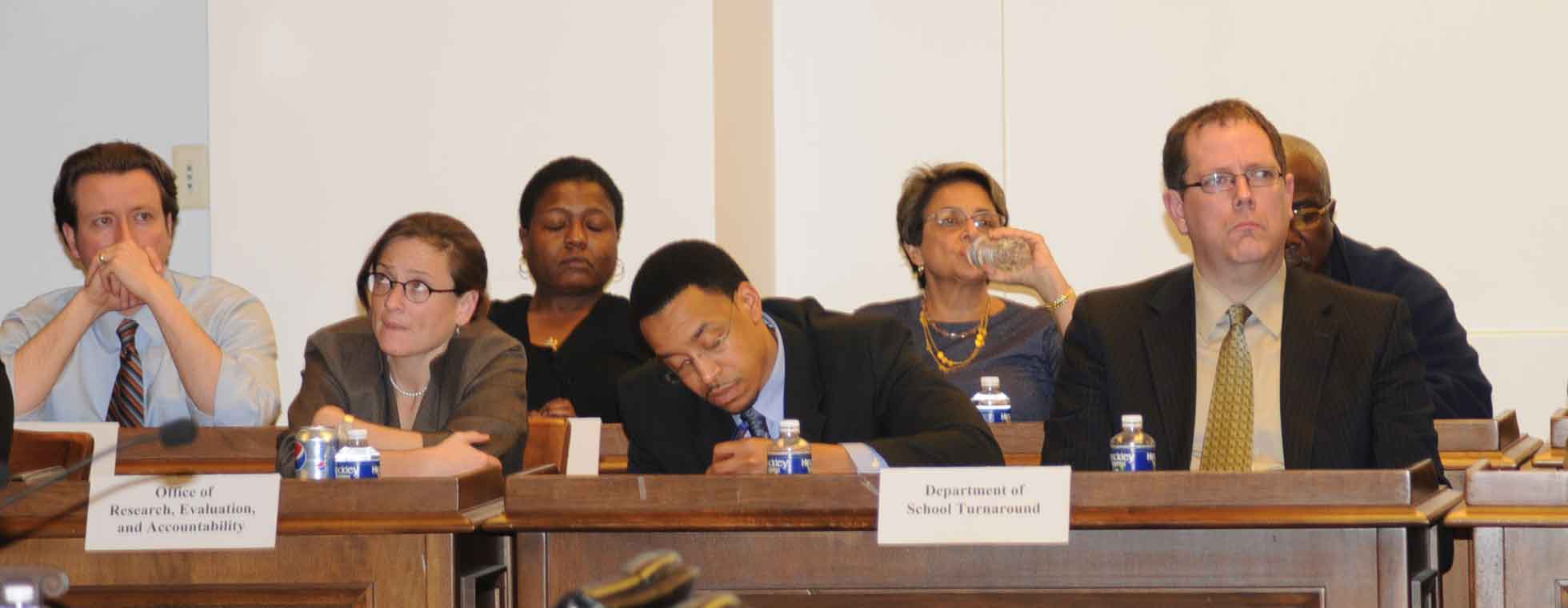 Each night since the hearings began on January 26, 2009, the people speaking at the hearings to demand that their schools not be phased out, condolidated, turned around, or simply closed were led to believe that they were speaking to the members of the Chicago Board of Education. Not one member of the Chicago Board of Education was present during the lengthy hearing on Fenger, although at least one person sitting behind the railing in the Board chambers thought it was OK to nap while Fenger teacher David Little was delivering an impassioned and reasoned defense of Fenger and its teachers. Subsance photo by George N. Schmidt.Barrett pointed out that the Board had already made their decisions regarding the schools to be turned around. He said that 13 years of failure is dehumanizing to teachers, students and communities and cited Huff’s story earlier in the night as an example of how Fenger students had taught CPS not to dehumanize people. Barrett said that the Office of New Schools has a record of dehumanizing students and said that someone from that office had called Julian High School “a pile of garbage.” Barrett demanded a moratorium on school closings and turnarounds and suggested that the Board and the mayor himself were the ones who needed a turnaround.
Each night since the hearings began on January 26, 2009, the people speaking at the hearings to demand that their schools not be phased out, condolidated, turned around, or simply closed were led to believe that they were speaking to the members of the Chicago Board of Education. Not one member of the Chicago Board of Education was present during the lengthy hearing on Fenger, although at least one person sitting behind the railing in the Board chambers thought it was OK to nap while Fenger teacher David Little was delivering an impassioned and reasoned defense of Fenger and its teachers. Subsance photo by George N. Schmidt.Barrett pointed out that the Board had already made their decisions regarding the schools to be turned around. He said that 13 years of failure is dehumanizing to teachers, students and communities and cited Huff’s story earlier in the night as an example of how Fenger students had taught CPS not to dehumanize people. Barrett said that the Office of New Schools has a record of dehumanizing students and said that someone from that office had called Julian High School “a pile of garbage.” Barrett demanded a moratorium on school closings and turnarounds and suggested that the Board and the mayor himself were the ones who needed a turnaround.
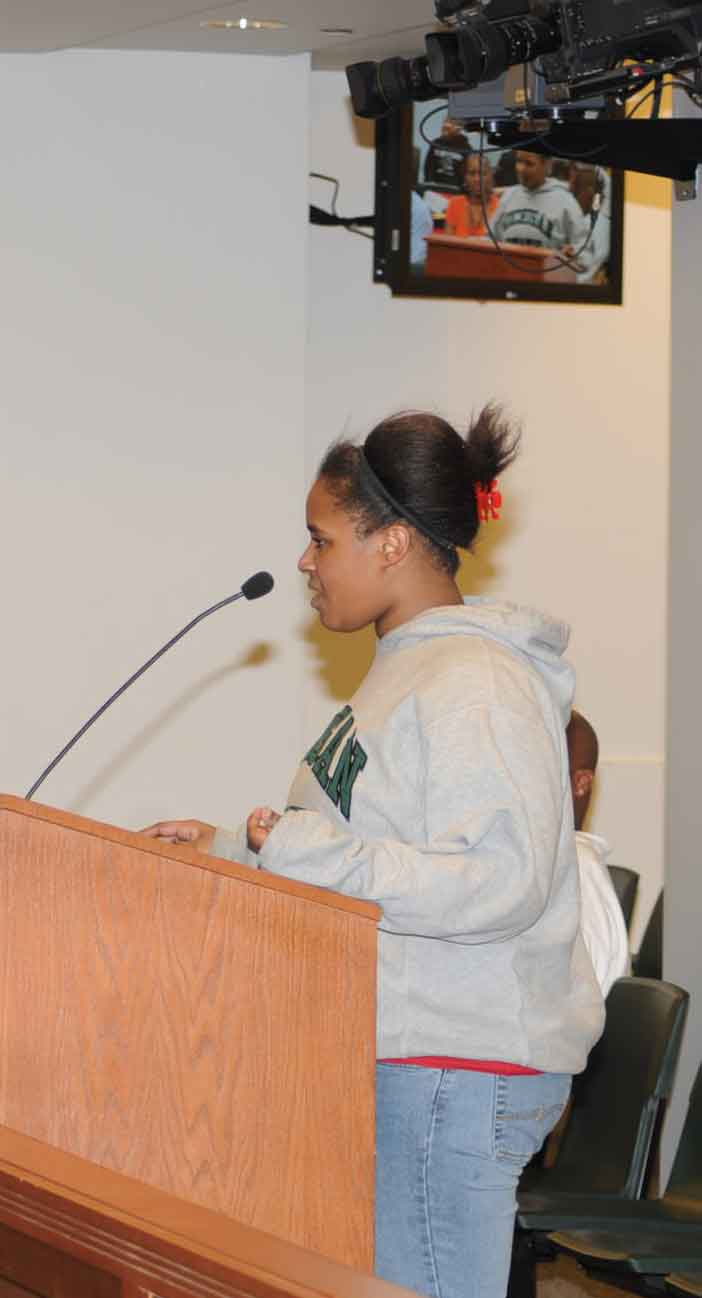 The hearing officer ordered student Kellina Mojica to step aside, claiming that students under the age of 18 were not permitted to speak at the hearings on the record in their own names. Throughout the 22 hearings on this year's round of school closings, phase outs, consolidations, and turnarounds, the Board of Education's Law Department and the hearing officers have refused to allow students to testify even when those students had parental permission to be at the public hearings. Parents and teachers noted that some of the most powerful testimony -- testimony that should have been part of the official record -- came from students (some as young as seven or eight years old) from across Chicago during the hearings. As many as 200 students showed up for the hearings to speak out, and most were barred. Substance photo by George N. Schmidt. Kellina Mojica, a student from Julian attempted to testify next, but was told she was not allowed to speak by the hearing officer because her parents were not present. Mojica questioned the officer, asking why she was allowed to comment at Board of Education meetings without a parent present, but not at this hearing which is “a much smaller deal.”
The hearing officer ordered student Kellina Mojica to step aside, claiming that students under the age of 18 were not permitted to speak at the hearings on the record in their own names. Throughout the 22 hearings on this year's round of school closings, phase outs, consolidations, and turnarounds, the Board of Education's Law Department and the hearing officers have refused to allow students to testify even when those students had parental permission to be at the public hearings. Parents and teachers noted that some of the most powerful testimony -- testimony that should have been part of the official record -- came from students (some as young as seven or eight years old) from across Chicago during the hearings. As many as 200 students showed up for the hearings to speak out, and most were barred. Substance photo by George N. Schmidt. Kellina Mojica, a student from Julian attempted to testify next, but was told she was not allowed to speak by the hearing officer because her parents were not present. Mojica questioned the officer, asking why she was allowed to comment at Board of Education meetings without a parent present, but not at this hearing which is “a much smaller deal.”
Lawrence Tills, whose affiliation with Fenger I didn’t hear spoke next and requested that the population of students at Fenger be looked at.. He said they had a large percentage of students in special education, and many that had previously been institutionalized. Tills pointed out that Fenger’s Achievement Academy, which is also going to be turned around, is comprised of students that have not graduated from grammar school but are too old to be in grammar school still. He said that many Fenger students have to take their own children to babysitters in the morning before they come to school.. He asked “how are we supposed to make them smart” when many of them are reading at a 4th or 5th grade level when they come to Fenger. He asked if they were supposed to “wave the Fenger wand” and change the students.
OKema Lewis, an educational consultant requested that the Board share information with parents and said that the parents “haven’t been heard.” She cited a section of Title I that required “prompt notice” of changes to schools. She said that decisions have been based on an emotional barometer and said parents “have not been informed of their rights regarding corrective action” for Fenger. She said the Board was obligated to provide prompt information to parents and teachers and that they were entitled to comment on the changes. Lewis cited Mojica’s inability to testify because she wasn’t informed that she needed a parent’s permission to speak as an example of the lack of information provided to parents. Lewis said that the district received Title I money based on income only and said that “students haven’t’ had resources to support their needs.” Lewis stated that the “district has failed because they didn’t comply with informing schools or providing resources” that are necessary under Title I. She said now the issue will go to the state.
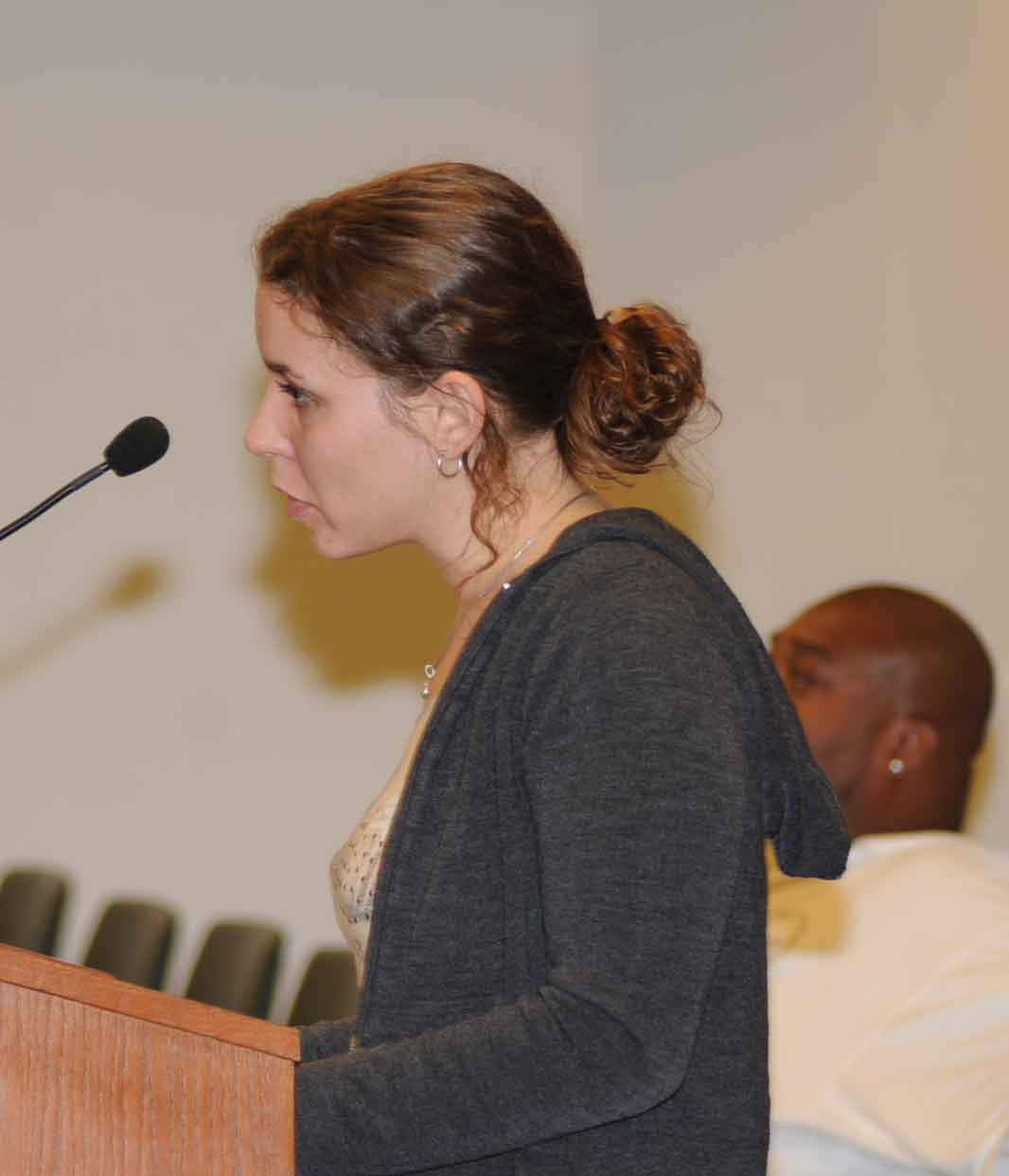 Teacher and CORE member Kristine Mayle (above) told the hearing that Fenger should not be "turned around". Mayle's school, De La Cruz Elementary, will be closing this June as a result of the closing and turnaround activities of the Board of Education undertaken using the same rituals and scripts in January and February 2008. Substance photo by George N. Schmidt.Greg Steaphus, a community member and chair for the National Peace Consortium said that there was a mismatch between Fenger’s needs and the suggested solution which was clear from the Renaissance 2010 data. He said that Renaissance 2010 money is being extended before establishing how it should be spent. Steaphus stated that “$27 million has been spent on six schools” thus far and that “nothing has worked” over the course of the five year program. Steaphus pointed to data that showed that 98 high schools and 298 elementary schools in Chicago did not make AYP in 2008. He cited the 50% dropout rate as further evidence of the system’s failure. He said that 23 Ren2010 schools did not make AYP last year. Steaphus suggested that support should be provided by helping Barbara Eason Watkins deal with “foundational issues first” then by providing “structural support” as well as scientific and technical help. He said they need to look at what parents need, so that they could “then leverage experience to collaborate and make schools successful.” Steaphus said that he had been giving CPS CEOs including Duncan and Scott recommendations for the past seven or eight years. He concluded by suggesting that the Board could help by not punishing Fenger and other schools with the “same underdeveloped practices” they have been using.
Teacher and CORE member Kristine Mayle (above) told the hearing that Fenger should not be "turned around". Mayle's school, De La Cruz Elementary, will be closing this June as a result of the closing and turnaround activities of the Board of Education undertaken using the same rituals and scripts in January and February 2008. Substance photo by George N. Schmidt.Greg Steaphus, a community member and chair for the National Peace Consortium said that there was a mismatch between Fenger’s needs and the suggested solution which was clear from the Renaissance 2010 data. He said that Renaissance 2010 money is being extended before establishing how it should be spent. Steaphus stated that “$27 million has been spent on six schools” thus far and that “nothing has worked” over the course of the five year program. Steaphus pointed to data that showed that 98 high schools and 298 elementary schools in Chicago did not make AYP in 2008. He cited the 50% dropout rate as further evidence of the system’s failure. He said that 23 Ren2010 schools did not make AYP last year. Steaphus suggested that support should be provided by helping Barbara Eason Watkins deal with “foundational issues first” then by providing “structural support” as well as scientific and technical help. He said they need to look at what parents need, so that they could “then leverage experience to collaborate and make schools successful.” Steaphus said that he had been giving CPS CEOs including Duncan and Scott recommendations for the past seven or eight years. He concluded by suggesting that the Board could help by not punishing Fenger and other schools with the “same underdeveloped practices” they have been using.
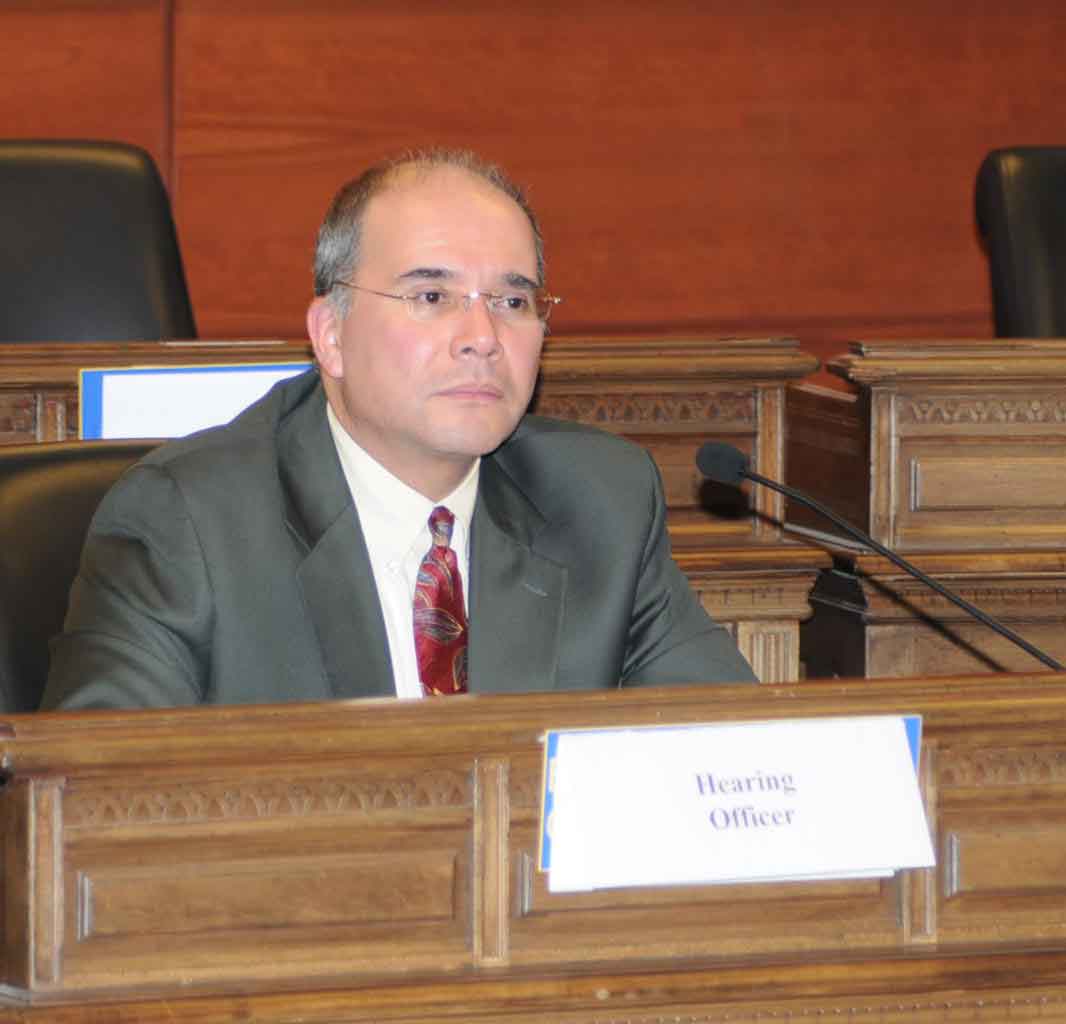 Although he announces at the beginning of every hearing that he is an "independent hearing officer," Respicio Vazquez (above, at the Fenger hearing) is a partner in the law firm that does most of the labor union negotiations for Mayor Daley. The Chicago Board of Education has refused to explain how an attorney can be an "independent hearing officer" in these matters when the firm for which the attorney serves as a partner regularly receives more than $1 million per year in business as an outside contractor with CPS (and additional business from other entities of city and county government under the Daley administration's control. Substance photo by George N. Schmidt.Danielle Ciesielski of CORE was the final speaker of the night. She called for a moratorium citing that the results of Renaissance 2010 have not been proven. She stated that she realized she was “not speaking to a body with any vote,” to again point out that there weren’t any Board members present. Ciesielski said that at her school, Robeson, the math program Agile Mind had been “imposed on us.” She said that in that program, there was an entire week devoted to misleading graphs. She suggested that Reynolds be taught about creating graphs by the teachers that were familiar with the misleading graphs curriculum.
Although he announces at the beginning of every hearing that he is an "independent hearing officer," Respicio Vazquez (above, at the Fenger hearing) is a partner in the law firm that does most of the labor union negotiations for Mayor Daley. The Chicago Board of Education has refused to explain how an attorney can be an "independent hearing officer" in these matters when the firm for which the attorney serves as a partner regularly receives more than $1 million per year in business as an outside contractor with CPS (and additional business from other entities of city and county government under the Daley administration's control. Substance photo by George N. Schmidt.Danielle Ciesielski of CORE was the final speaker of the night. She called for a moratorium citing that the results of Renaissance 2010 have not been proven. She stated that she realized she was “not speaking to a body with any vote,” to again point out that there weren’t any Board members present. Ciesielski said that at her school, Robeson, the math program Agile Mind had been “imposed on us.” She said that in that program, there was an entire week devoted to misleading graphs. She suggested that Reynolds be taught about creating graphs by the teachers that were familiar with the misleading graphs curriculum.
Ciesielski then explained how Reynolds’s graph comparing 0% of Fenger’s students exceeding standards to 3.5% of the district meeting standards was misleading. She suggested that AMPS teachers, who are regarded as exceptional teachers by the district, replace the teachers at Fenger and insisted that the school still would not change because the problem at Fenger is a societal problem and not an academic one.
Ciesielski pointed out the importance of having veteran African American teachers in schools and suggested that she herself would not have survived a month of teaching without the wisdom of experienced teachers like those at Fenger giving her guidance and suggestions because they “know how to teach teachers.” Ciesielski concluded by saying that when she recently attended the New Schools Expo, teachers repeatedly said that they “believe students can perform.” She stated that the Fenger teachers could do better than that because they “know students can perform” and “know how to make people succeed.

